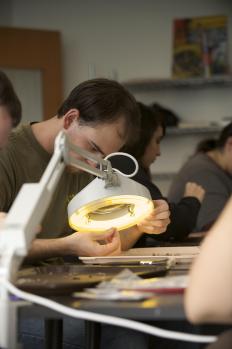Careers

Comprehensive Skill Base & Unlimited Career Potential
Our program will help you learn to critically examine human biological and cultural diversity and evolution. In the process, you'll gain valuable experience conducting research, applying scientific methods to your observations, and communicating your conclusions through compelling written and oral presentations. In addition to gaining a broad understanding of human biology, nature and society, you will gain expertise in specific topics and world regions that most interest you.
A broad understanding humanity and experience working with people from different backgrounds are important assets in our increasingly diverse world. In that respect, very few disciplines can prepare you for success like Anthropology. A degree in Anthropology also provides you with strong research and presentation skills—both of which have consistently helped our graduates excel in a wide range of careers.
Humboldt anthropology students gain specialized knowledge and research skills in one or more subfields and world regions through advanced coursework and hands-on laboratory and field experiences. This provides an ideal basis for successful employment in a wide range of careers in todays academic, nonacademic, and increasingly global job market, as well as continuation in advanced degree programs.
Anthropologists strive to learn what people think is important in different circumstances, which is critical to learning how to communicate effectively in a wide variety of cultural situations and work environments.
The following are some of the many paths Anthropology majors have taken:

Career Areas Traditional/Intrinsic to AnthropologyAll subfields: College Professor, Educator, Researcher, Writer, Museum Docent/Curator Archaeology: Registered Professional Archaeologist, Cultural Resources Manager, Historian, Area Specialist (e.g., Mayanist, Egyptologist) Biological Anthropology: Primatologist (behavior/ecology/conservation), Paleoanthropologist, Forensic Anthropologist, Bioarchaeologist, Evolutionary Theorist Cultural Anthropology Ethnographer, Community/International Development Worker, Advocate, Social/Environmental Justice Worker, Medical Anthropologist, Diplomat, NGO/Aid Worker, Civil Rights Worker, Cultural Consultant Linguistic Anthropology: Linguistic, Semantic & Rhetoric Analyst (media, politics...), Narrative Analyst, Translator, Speech Communities Worker, Linguistic Pragmatics Fields, fields of cultural anthropology |
Some Additional/Applied Career Trajectories for Anthropology MajorsApplied Archaeology: Contract Archaeologist, Heritage Preservation Officer, Archaeologist with U.S. Forest Service, Archaeologist with Caltrans, Zooarchaeologist, Maritime Archaeologist Advocacy/Aid: Advocate, Program Developer, Analyst, Social/Environmental Justice Worker, Conservationist, NGO/Aid Worker, Civil Rights Worker, Disaster Relief Worker. Business: Administrator, Business Owner/Manager, Analyst, Science/Technical Writer, Program Developer, Novelist, Media/Advertising Executive, Film-maker, Journalist/Reporter, Software/Website Designer. Government/Law: Diplomat, Politician, Educator/Education Policy Worker, Lobbyist, Lawyer, Police Officer, Deputy Coroner, FBI/CIA Agent, Forensic Investigator. Anthropology is a popular pre-law degree; the Pre-Law Advising website offers guidance and resources. Biology/Health: Evolutionary Health & Nutrition Consultant, Community/Public Health Officer, Biomedical Lab Technician, Autopsy Technician, Veterinary/Shelter Staff, Animal Trainer, Skeletal Biologist, Animal Rescue Worker, Zoo Staff, Healthcare Researcher/Analyst, Osteopathic Doctor. The Pre-Professional Health Program has advice on relevant prep coursework for those interested in pursuing professional health-related fields with their anthropology degree. Check out these Biographies of Famous Anthropologists. |
Career ResourcesAnthropology students explore and prepare for careers throughout the program, and are encouraged to engage in volunteer and internship activities to explore career trajectories. In addition, the Career Center web site includes resources that help students to explore careers, including job search tools, search engines, and help preparing resumes and planning for interviews. The idealist.org site on the Center website enables students to find jobs based on geography, culture, area of focus, job function and so on. Students have access 24/7 to the online job board. The Center has also established a Facebook page that has regular updates on career events and jobs. Center staff can work with students at a distance in reviewing drafts of resumes and cover letters using telephone and E-Mail Monday through Friday 8 a.m. to 5 p.m. The Alumni Office also offers interview coaching (mock interviews). Check out this anthropology career guide. |
